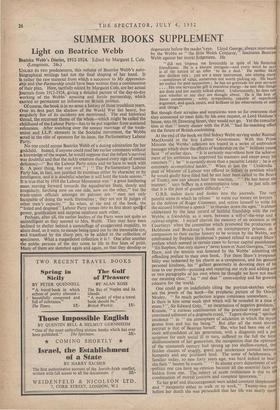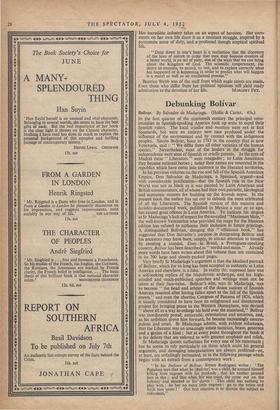SUMMER BOOKS SUPPLEMENT
Light on Beatrice Webb
Beatrice Webb's Diaries, 19124924. Edited by Margaret I. Cole. (Longmans. 24s.)
UNLIKE its two predecessors, this volume of Beatrice Webb's auto- biographical writings had not the final shaping of her hand. It is rather the raw material from which a successor to My Apprentice- ship and Our Partnership could have been written than a continuation of their plan. Here, tactfully edited by Margaret Cole, are her actual journals from 1912-1924, giving a detailed picture of the day-to-day working of the Webbs' amazing and fertile partnership, which exerted so permanent an influence on British politics.
Of course, the book is in no sense a history of those troublous years. Over its first part the shadow of the World War lies heavy, but singularly few of its incidents are mentioned. The real historical thread, the recurrent theme of the whole—which might be called the childhood of the Labour Party—has to be put together from scattered references. After watching over the uneasy marriage of the trade- union and I.L.P. elements in the Socialist movement, the Webbs, acted in the role of sponsors for its issue, the Parliamentary Labour Party.
No one could accuse Beatrice Webb of a doting admiration for her godchild. Indeed, if anyone could read her earlier comments without a knowledge of the sequel, he would suppose that the infant's survival was doubtful and that the sickly creature showed every sign of mental deficiency—" But the Labour Party exists and we have to work with it. A poor thing, but our own " ; " The Parliamentary Labour Party has, in fact, not justified its existence either by character or by intelligence, and it is doubtful whether it will hold the trade unions." It is true that by 1918 the Labour Movement was " a great lumbering mass moving forward towards the equalitarian State, slowly and irregularly, lurching now on one side, now on the other," but the trade-union officials amongst its patrons are " men not only Incapable of doing the work themselves ; they are not fit judges of other men's capacity." So when, at the end of the book, the "hated and despised" Labour Party comes into its first short spelliof power, gratification and surprise reinforce each other.
Perhaps, after all, the earlier leaders of the Party were not quite so unintelligent as they seemed to Mrs. Webb. They may have been inclined to shelter behind a camouflage of exaggerated stupidity, to sham dead, as it were, to escape being spied out by the inexorable eye, and transfixed by the sharp pen, to be added to the collection of specimens. What a magnificent collection it is ! One after another the public persons of the day come to life in five lines of prhit. Many of them are sketched again and again, so that they develop or
degenerate before the reader's eye. Lloyd George, always mistrusted by the Webbs as " the little Welsh Conjuror," fascinates Beatrice Webb against her moral judgement. He " did not impress me favourably in spite of his flattering friendliness. He is a blatant intriguer—and every word he says is of the nature of an offer ' to do a deal.' He neither likes nor dislikes you ; you are a mere instrument, one among many —sometimes of value, sometimes not worth picking up. He bears no malice for past opposition ; he has no gratitude for past services .... His one serviceable gift is executive energy—he sees that things are done and not merely talked about. Unfortunately, he does not care whether or not they are thought about. He is the best of boon companions ; witty, sympathetic, capable of superficial argument, and quick retort, and brilliant in his observations of meo and things."
Etut though their scruples and suspicions were so far overcome that they consented to meet him, by his own request, at Lord Haldane's house, into 10, Downing Street, they would not go. Yet the consulta. tion at that " lonely dinner with the P.M." tad far-reaching effect on the future of British coalmining.
At the end of the book we find Sidney Webb serving under Ramsay MacDonald in the first Labour Government. With this Prime Minister the Webbs' relations are traced in a series of ambivalent passages which show the effects of leadership on the " brilliant young Scot " of earlier days. " It is certainly marvellous how the achieve- ment of his ambition has improved his manners and swept away hi rancours " ; he " is certainly more than a passable Leader ; he is a extremely accomplished leader." When at last the " Cinderella ' post of Minister of Labour was offered to Sidney (a position whi he would gladly have filled had he not later been called-to the Boar of Trade), one can almost hear the reaction. " He has learnt th manner; says Sid'hey in a contemplative tone : he just tells m that it is the post of greatest difficulty '."
G.B.S. makes darts and dashes into the journals. The ye painful scene in which he refuses " to waste our money on lawyers in the defence of Roger Casement, and retires himself to write fo the accused Irishman a speech " to thunder down the ages," is almos obliterated by the later record of faithful friendship with the tw Webbs, a friendship, as it were, between a will-o'-the-wisp and railway-engine. 1 myself cherish the memory of an occasion at th Courtneys'' when the committee which promoted the production o Hobhouse and Brockway 's book on contemporary prisons, as companion to their earlier history to be written by the Webbs, w confronted by Stephen Hobhouse's pained refusal to accept Shaw' preface which seemed in certain cases to favour capital punishment "Eh Stephen, that only shows y' never knew m 'Aunt Georgina," crie Shaw, and the tension was lessened by the Webbs' admitting t offending preface to their own book. For them Shaw's irresponsi bility was redeemed by his charm as a companion, and his genuine personal kindness, his " gallant generosity in devoting days of hi time to our proofs—pointing and repairing our style and adding on' or two paragraphs of his own where he thought we have not mad' our meaning clear," his " real dear " comradeship and his growini concern for the world.
One could go on indefinitely citing the portrait-sketches whicl are the jewels of the book—the prophetic picture of Sir Oswald Mosley, " So much perfection argues rottenness somewhere.. . Is there in him some weak spot which will be revealed in a time stress ? ", Sir Edward Grey, " an incarnation of negative goodness,' Krassin, " a curious combination of the practical expert and th convinced adherent of a dogmatic creed," Tagore showing " spiritu insolence " in " the atmosphere of adulation in which the mysu genius lives and has his being." But after all the most movin portrait is that of Beatrice herself. She, who had been one of th most self-confident of her generation, with a diagnosis and a pr scription for each social ill in turn, suffered to the full the bitt disillusionment of her generation, the recognition that the optimis of the nineteenth century had sprung up too shallow-rooted, th hidden chasms of cruelty, greed and intolerance yawned betwee humanity and any promised land. The sense of helplessness, s familiar today, so new forty years ago, was hard indeed to bear she feels " beaten by events." " In almost every department of w "politics one can have no opinion because all the essential facts or hidden from one. The misery of acute restlessness is due to tb combination of mortal concern and complete ignorance." _ To her grief and discouragement were added constant sleeplessne and " incapacity either to walk or to work." Twenty-two yea before her death she was persuaded that her life was nearly spen Her incredible industry takes on an aspect of heroism. Her com- ments on her own life show it as a constant struggle, inspired by R passionate sense of duty, and a profound though sceptical spiritual life.
" Deep down in one's heart is a realisation that the discovery of the laws of nature in order that men may become creators of a better world, is an act of piety, one of the ways that we can bring about the Kingdom of God. The scientific temperament, the desire to measures to record, to test, and to explain correctly what has happened or is happening in order to predict what will happen is a moral as well as an intellectual process." Beatrice Webb was of the stuff from which eagle saints are made. Even those who differ from her political opinions will yield ready



























































 Previous page
Previous page